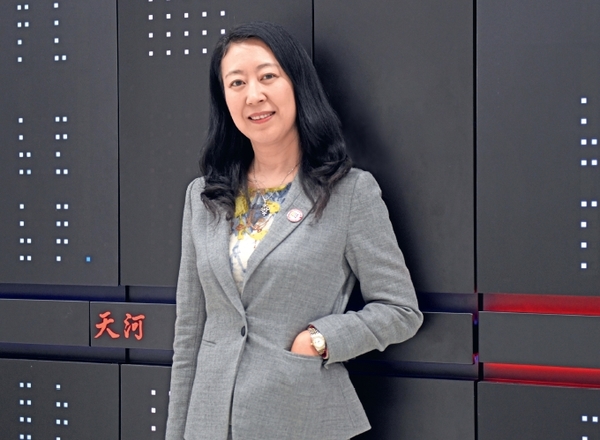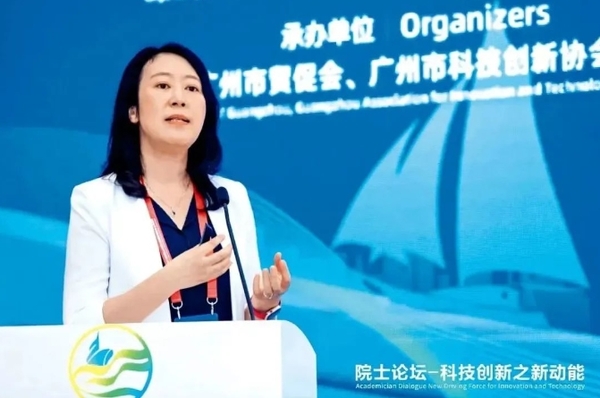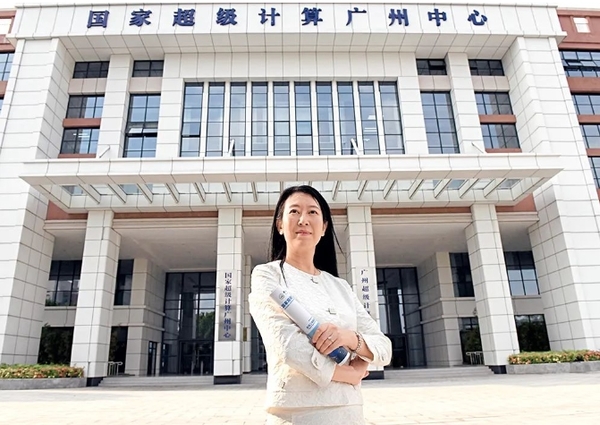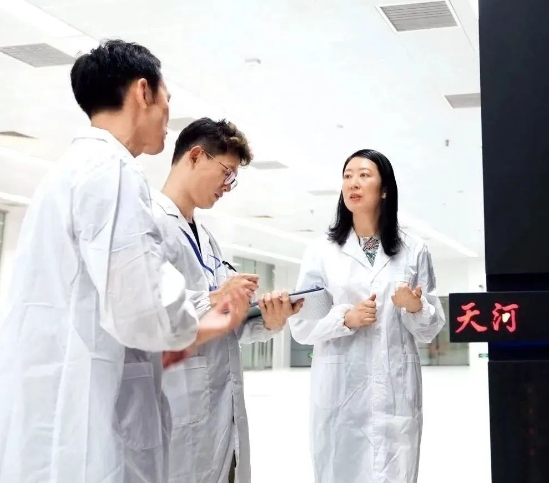Woman Scientist Makes China Stand Out in Global Supercomputing Industry

Lu Yutong, director of the National Supercomputer Center in Guangzhou (in south China's Guangdong Province), and a professor with the School of Computer Science and Engineering, Sun Yat-sen University, has dedicated herself to helping China achieve its tremendous, decade-long progress in the global supercomputing industry. Lu was appointed program chair of the 2019 ISC High Performance conference. She made history, as both the first woman and the first Chinese scientist to be the conference's program chair. In 2022, she was named a National March 8th Red-Banner Pacesetter and one of the Most Beautiful Women Strivers.
Supercomputing, a form of high-performance computing, is measured in floating-point operations per second (flops). Using the Tianhe-2 (Milky Way-2) supercomputer as an example, its calculation capacity is 33.86 petaflops, equivalent to 33,860 quadrillion calculations per second. Also, its storage capacity is super large. If the Tianhe-2 supercomputer is used to store digital books, it can store about 100 billion books, each one with 100,000 words.
Supercomputing has been applied in various fields, such as biomedicine, aeronautics, high-speed rail, industrial design, and weather forecasting. The flourishing artificial intelligence also relies on the high-performance computing derived from supercomputers.
Many countries have attached great importance to the development of supercomputing. China has always held the development of supercomputing to be an important direction in its development of science and technology. Now, China's supercomputing sector is among the global leaders. Lu's center ranks among the world's top five most-influential supercomputer centers. Lu has led her team in achieving numerous important innovation results and technological breakthroughs in supercomputing. The center also provides ordinary people, from all walks of life, with convenient access to supercomputing services. For Lu, supercomputing is not only a powerful tool for scientific research, but it can also serve people's daily lives.

Early Years
Lu's parents encouraged her to develop good learning habits when she was young. She liked to read science fiction and fairytales at that time. Her father encouraged her to read books that interested her, and not just textbooks.
"My parents' trust in me, and the freedom they gave me, allowed me to eventually work in the industry that I really love … (Their education) has benefited me, and will benefit me for the rest of my life," says Lu.
"When I was studying in the High School Attached to Hunan Normal University, I participated in colorful extracurricular activities … and I read the largest number of extracurricular books … which helped me improve my comprehensive qualities. At that time, I did well in math. I think my prudent and careful attitude toward science was cultivated at high school," Lu continues.
Yinhe-1 (Galaxy-1), a supercomputer with a performance of 100 million flops, was developed by the National University of Defense Technology (NUDT), in Central China's Hunan Province, in 1983. China became the third country (behind the United States and Japan) to become capable of developing a supercomputer.
Lu, then a first-year student in high school, visited the supercomputer with her classmates. "The volume of Yinhe-1 was similar to a small meeting room. Its surface was covered with countless electronic tubes. I was attracted by the giant computer. Later, I learned more about the importance of the supercomputer. So, I decided I would conduct scientific research in the future. I was enrolled at the school of computer science, under NUDT, after I graduated from high school," recalls Lu.
"At that time, I did not imagine I would become a scientist in the future. Of course, I think I am now a 'programmer,' instead of a scientist. I only hope to do what I should do, and to make contributions to society, no matter if they are big or small. I hope to be a useful person to the country, and in society," says Lu.

Lu participated in the development of two versions of Yinhe supercomputers after she graduated from NUDT, with a postgraduate degree. Then, she received the opportunity — provided by China Scholarship Council — to continue her studies abroad. However, China planned to update the Yinhe supercomputer system, so, as the backbone of her team, Lu gave up the opportunity to study abroad. She has since participated in the development of several versions of Yinhe supercomputers, and two versions of Tianhe supercomputers.
"In the beginning, China followed developed countries in the supercomputing industry. Then, we caught up with the developed countries, and we finally surpassed them. I never regret giving up the opportunity to study abroad. I witnessed and contributed to the rapid progress of China's supercomputing industry," Lu says.
China's Great Leap
During her fourth year at the university, Lu had a tutor, who was responsible for developing the compiler of the Yinhe-2 supercomputer. Lu helped her tutor test and verify the supercomputer system. "Different from current computing technologies, we had to input all of the programs via character interface, in order. We had to start all over again if we made a mistake. We had to conduct every process patiently, and carefully. Because of their care and prudence, Chinese researchers developed the supercomputer independently," Lu recalls.

On June 17, 2013, Tianhe-2 topped the top-500 list of the world's fastest supercomputers. It remained the fastest supercomputer in the world until June 2016, when it was surpassed by another supercomputer developed by Chinese researchers. During the development stage, Lu, who was deputy chief designer of the Tianhe-2 supercomputer, and her team encountered many difficulties. She led her team in making breakthroughs, step by step, in several key supercomputing technologies. To adjust the performance parameters of the software, they conducted hundreds of millions of tests over three months. During the most important development period, they worked together to resolve key technical difficulties.
"What inspires me and my colleagues to tackle challenges in scientific research is the spirit of patriotism, cooperation and indomitable struggle, all of which have been passed down from previous generations of Chinese supercomputing researchers. My teammates and I have constantly surpassed ourselves, and we have strived to build a world-class supercomputing center," Lu says.
Lu often encourages the young members of her team to conduct in-depth studies of principles and technologies through practice, and to dare to put forward different opinions from current research results. They have been encouraged to boldly put forward their own ideas, to analyze and study independently, to try to find the shortcomings of current research results, and to suggest ways to improve the technologies.
During the early 1990s, Lu used her desktop computer to browse the cutting-edge information related to the computer industries of other countries. "I was probably one of the first Internet users in China. Whether you go abroad or not, you can find ways to learn about the outside world, and to expand your international vision," Lu says.

China's supercomputing researchers have expressed their opinions during international academic activities in recent years, and their participation in such events has earned them recognition from global supercomputing experts. "As our country has achieved many technical breakthroughs, and as our national power has been enhanced, Chinese scientists have accomplished, and will accomplish, many achievements. Our generation of supercomputing researchers will dedicate ourselves to the construction and development of China's supercomputing industry," says Lu.
The annual ISC High Performance is Europe's most-important conference and networking event for the high-performance computing community. Lu in 2017 was appointed a Fellow by ISC, because of her important contributions to the advancement of high performance computing. She is both the first Chinese and the first woman Fellow of the conference. In 2019, Lu was appointed program chair of the conference. She is the first woman to be the conference's program chair.
"Due to the rapid development of China's supercomputing industry, I was able to gain a foothold in the conference, on behalf of Chinese scientists. It was also a recognition of my level of professionalism by the international academic community. I am very excited China has finally made its voice heard by the international academic community in the field of the supercomputing industry," Lu says.
Lu shines bright in the supercomputing industry, a field where men greatly outnumber women. Women, like Lu, are a rare exception in the field. "Even though there are few women researchers in this field, women do as well as men in their work. In fact, women have their own advantages," says Lu. "Women researchers may pay more attention to details in technical proposals. In addition, team cooperation is very important for large-scale supercomputing engineering projects. Women members can give full play to their advantages in communication."
Lu hopes more young people will get involved in supercomputing research in the future, to create more convenience for people through supercomputing, and to help China's supercomputing industry reach a higher level.
Photos Supplied by School of Computer Science and Engineering, Sun Yat-sen University and Interviewee
(Women of China English Monthly August 2023 issue)
Please understand that womenofchina.cn,a non-profit, information-communication website, cannot reach every writer before using articles and images. For copyright issues, please contact us by emailing: website@womenofchina.cn. The articles published and opinions expressed on this website represent the opinions of writers and are not necessarily shared by womenofchina.cn.






.jpg)

 WeChat
WeChat Weibo
Weibo 京公网安备 11010102004314号
京公网安备 11010102004314号